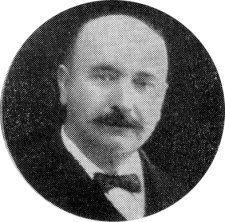
THE LATE AMBROSE QUALTROUGH, M.H.K. (Rushen)
[from Reminiscences of M.L.P.]
WHAT the "Isle of Man Times" described as an important event in the political and social history of the Island, namely the first Annual Conference of the newly-formed Labour Party, was held in Salisbury Hall, Douglas, on Saturday, September 7th, 1918.
The Bread Strike of the previous July had brought home to the workers the necessity of political as well as industrial action if any advance was to be made in the amelioration of the conditions of life at that time.
As I have previously recorded, small but none the less enthusiastic branches of the Independent Labour Party had been formed in the Island, but the trade union movement had contented itself with the passing of pious resolutions and forwarding them through the medium of the Trades and Labour Council to Mebmers of the House of Keys, with a request that they should be implemented. A lot of sympathy was expressed by the Members of the House of Keys with the objects put forward, but little, if anything was done. It was therefore decided to combine the political movement which then existed with the trade union movement, the outcome of which was the formation of the Manx Labour Party.
The Conference first met in private session and elected the following as the first Executive of the Party: John Coole (Tailors Association), William P, Clucas (Peel Workers Union), James R. Corrin (Rushen Branch, Carpenters and Joiners), William Dickinson (Ramsey Branch Workers Union), Harry M. Emery (Shop Assistants' Union), James D. Fell (Typographical Association), Miss Annie Watterson (Douglas Class Teachers Association), Christopher R. Shimmin (Peel Branch, Workers Union), Richard Kneen (Rushen Branch, Workers Union), James H, Cowley (Douglas Branch, Workers Union), J. J. Hodson (Douglas Branch, Workers Union), J. W. Cannell (Douglas Class Teachers Association), Arthur Hadley (Ramsey Branch, Workers Union), Miss Nellie Taylor (Shop Assistants' Union). I was elected Treasurer.
[27] A public meeting followed. Mr. William Clucas was the chairman and in his address emphasised the stupendous task before the Party. The Party, he said, had a deliberate thought full, systematic and comprehensive plan of social rebuilding Which Tynwald would be driven to undertake, The first principle of the Labour Party, he said, was to secure to every member of the community, in good times and in bad times alike, all the requisites of a healthy life and worthy citizen ship. The programme was far-reaching, and the ensuing fight for its attainment was bound to be a fierce and strenuous one. He ventured to assert that with loyalty to each other, fidelity to principles, and active propaganda, in five years they would see remarkable changes in the Isle of Man.
Mr. J. R. Corrin pressed for the setting up of a Labour Exchange and unemployment insurance.
Mr. J. D. Fell dealt with the need of a Workman's Compensation Act. At that time the only legislation on the subject was the Employers' Liability Act, under which a workman had more or less to prove negligence on the part of the employer. (Due to pressure from the Labour Party, the Workman's Compensation Act was placed on the Statute Book in 1919.
Miss Annie Watterson (who is now Mrs. Gerald Bridson, J.P.) gave a fine speech on education, emphasising the need for one Education Authority, a school medical service, and school clinics (all of which are now accomplished facts).
Other demands were for the immediate introduction of old age pensions and redistribution of seats in the House of Keys.
(The above notes of speeches made at the Conference are culled from minutes of the meeting taken at the time),
An interested member of the audience was the late Mr. A. H. Teare, at that time M.H.K. for Ramsey.
[28]
IN THESE DAYS, when so much effort is being made to attract industries to employ our workpeople, it is interesting to recall that towards the end of last century and the beginning of this century there were in the Island several flourishing trades employing quite a large number of workpeople tailoring, furniture manufacture, coach-building, etc. Those were the days before the advent of factory-produced clothing and furniture. The tailors, particularly, had a very strong trade union. Together with unions connected with the printing and building trades, a Trade and Labour Council was formed.
Round about that period Keir Hardie and Robert Blatchford (through the "Clarion") were preaching the doctrine of Socialism, and the more militant members of the trade unions set about establishing branches of the Independent Labour Party. Again, the lead in this new venture was taken by printers Jim and William Kewley, Fletcher Daugherty, David Jepson and the writer of this article. Others who took a prominent part were James P. Kewley (builder), Willie Moore (postman), Walter P. Cannell, Joe Devlin, Levi Garrett and Tommy Bryan.
We held meetings weekly in a Temperance Hall, which oddly enough was wedged among a row of pubs on the North Quay, where the Bus Station now stands. To spread the gospel, public meetings were held from time to time in the Grand Theatre and Noble's Hall, and prominent personalities like Tom Mann, Enid Stacey, Joe Pointer, J. H. Standring, Jim Parker, M.P., and others were brought over as speakers.
TOURISM at that time reigned supreme, The only bright spot was Rushen, where the Rushen Progressive Association was doing good work. Prominent in the work of that Association were Mr. James R. Corrin, J.P., and Mr. Ambrose Qualtrough, who later helped in founding the Manx Labour Party. [28]

THE LATE AMBROSE QUALTROUGH, M.H.K. (Rushen)
Tired of passing resolutions asking other people to give effect to them, we decided to take a hand in doing things for ourselves.
The opportunity came along in August, 1919. The death of Colonel Moore and Capt. Robert Moughtin created vacancies in the representation of Castletown and South Douglas. Although the House of Keys was due for dissolution in the following November, we decided to contest both seats.
I was nominated for South Douglas, and had as my opponent Mr. Leigh Goldie-Taubman. We fought the election at a great disadvantage. The voters list was sadly out-of-date. No revision had taken place during the war years, and large numbers of householders were either away in the Services or working in England. There was no adult suffrage then. However, we put up a good show, the result being: Leigh Goldie-Taubman 452; A, J, Teare 282 Majority 170.
Mr. J. R. Corrin consented to contest Castletown which was then looked upon as the strongest Tory stronghold in the Island, 'Three candidates were nominated Mr. Joseph Qualtrough, Mr. J. D. Qualtrough and Mr. James R. Corrin.
[30]
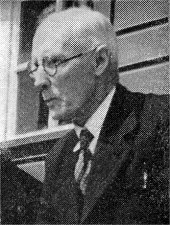
MR. J. R. CORRIN, J.P., M.L.C. (Rushen)
SOME rather amusing incidents arose out of these nominations. Mr, J, W. Corrin (brother of Mr. J. R. Corrin) was the proposer of Mr. Joseph Qualtrough, and laid an objection against the nomination of Lieut. J. D. Qualtrough on the grounds that his consent had not been obtained (J. D. Qualtrough was at the time on active service). The Returning Officer (Mr. H. R. Gelling) over-ruled the objection. Mr. Joseph Qualtrough was objected to by Mr. James Clague on the grounds that he was already a member of the House of Keys for Rushen, The Returning Officer over-ruled this objection also, as was also Mr. Joseph Qualtrough's application to withdraw his nomination. So three candidates went to the poll, which resulted in Lieut. J, D. Qualtrough being elected with 201 votes. Mr. J. R. Corrin secured 85 votes and Mr. Joseph Qualtrough 2 votes.
Though we were unsuccessful on this occasion, the tables were changed in the following November. A General Election for the House of Keys took place in that month, and was conducted for the first time on adult suffrage. [31] Labour made a determined bid for representation and nominated eleven candidates - Alderman T, M. Quayle and A. J. Teare for South Douglas, William T. Pickett for North Douglas, Gerald Bridson for Middle, William P. Clucas for Glenfaba, William Dickinson and T. Crossley for Garff, Charlie Gill for Michael, |, R. Corrin for Rushen, Arthur Hadley for Ramsey, and Christopher R. Shimmin for Peel.
I have in my possession a copy of the Labour Party Manifesto issued for that election, and it is interesting to recall what we stood for: The immediate introduction of Old Ape pensions of not less than 10/- a week at 65, irrespective of any income that may accrue by the thrift of the applicant; national health insurance, national sanatorium and hospitals; abolition of poor law; a national housing scheme, which the Party considered was the only way of providing sanitary dwellings at an economic rent; the setting up of industrial councils, representative of employers and employed; one educational authority instead of the numerous school boards. This policy made a strong appeal to the electors and resulted in four Labour members being returned as Members of the House of Keys for the first time.
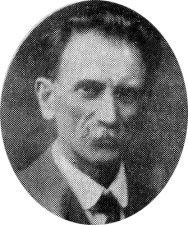
THE LATE CHRISTOPHER SHIMMIN, M.H.K. (Peel)
[32]I was returned for South Douglas at the head of the poll with 1,131 votes, Gerald Bridson secured the third seat in Middle with 735 votes, unseating Mr. W. F. Cowell, Christopher Shimmin was returned for Peel to fill the place of Tom Cormode, who did not seek re-election on account of ill-health.
Rushen provided the liveliest election of the lot. There were seven candidates for three seats, J. R. Corrin topping the poll with 1,043 votes. Remarkable scenes occurred. Disdaining the offers of conveyance to the poll, Labour supporters assembled at The Level and formed a procession, and in sections of fours, headed by their candidate, and a banner, marched to the polling booth at the Rushen Girls' School. After the announcement of the poll, J. R. Corrin and Ambrose Qualtrough were carried shoulder high to the Monument in the Market Square, Castletown, where they addressed their enthusiastic supporters.
Similar scenes were witnessed in Peel, where Eddie Kneen marshalled supporters in the Market Place and marched them up to the Court House booth.
Though unsuccessful, the other seven Labour candidates secured considerable support.
FOURTY TO FIFTY YEARS AGO Michaelmas Fair was quite an event in the Manx calendar. There was always a large gathering of farmers and farm workers the farmers on the look out for new men, the men on the look out for new employers. The event was always taken advantage of by Labour enthusiasts to hold meetings to propogate their ideals and encourage farm workers to organise. One such occasion is worth recounting.
The speakers at the meeting were Mr. Charles Ammon (later Lord Ammon), Mr. George Titt, the regional secretary [33] of the Workers Union (who later on occupied the position of Lord Mayor of Manchester) and Mr, William Clucas, of Peel.
Prior to the meeting commencing, I was approached by Charlie Gill, of Ballaugh, as to wether we would include him as one of the speakers. Charlie was an orator of no mean order and could always draw an audience.
He took as his text the Bible story of the years of plenty and the lean years, how the surplus of the years of plenty was stored in granaries against the lean years, and when they came, according to the Bible story, there was plenty for everyone,
Charlie went on to describe the bumper years the farmers had during the war years (1914-1918), and how they had stored their surpluses (profits) in the granary at the corner of Athol street (meaning, of course, the Bank), but now that the lean years had come, a different attitude to that of the Bible story was being adopted, and the farmers were refusing to distribute the surpluses amongst those who had by their labour helped to create them. (Charlie was at that time striving hard to organise farm workers and establish a minimum wage).
Now comes the part of this story I wish to recount. Having trounced the farmers to some pattern, Charlie went round with the hat to which friend and foe alike generously contributed, for the "entertainment " !
[34]
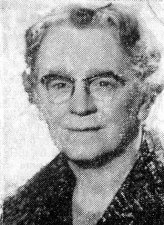
MRS. A. BRIDSON, J.P., M.H.K. (Garff)
THE Labour Party has the signal honour of being the only Party to have had feminine representatives in the House of Keys, and they proved themselves worthy of the honour. Annie Bridson (wife of Gerald Bridson, a former Member for Middle) represented Garff, and her knowledge of educational matters, in particular, was valuable.
On the death of Christopher R. Shimmin, his wife Marion was persuaded to allow herself to be nominated for her husband's unexpired term of office. No opposition was offered to her election, and she became the first woman Member of the House of Keys. I think I can truthfully say that Peel has never had a better representative.
[35]
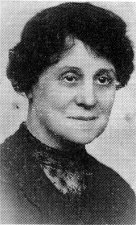
THE LATE MARION SHIMMIN, M.H.K. (Peel)
At the following General Election opposition was spoken of,. and I well remember Mrs. Shimmin asking me to come to: Peel and help her, as being somewhat new to office she felt she would perhaps not be able to stand up to "questioning time." I recall the eve-of-the-poll meeting in Michael Street Hall, Mr. Jenkinson (an old schoolmaster) was chairman and at the outset he explained he was non-partisan. As I have already said, Mrs. Shimmin was not au fait with several matters before the public and we had a talk as to procedure. I suggested to Mrs. Shimmin that she occupy her time dealing with subjects which vitally affected Peel and leave the other subjects to me.
Mrs. Shimmin had a little hoarseness in her voice, and after she had spoken for about half an hour I suggested to the Chairman that she should be given a rest. [36] The Chairman thought likewise, and rising to his feet expressed that view to the audience, and called upon me to speak. I spoke on a wide range of subjects, and when question time came I suggested (and it was accepted) that as I had dealt with these subjects I should answer any questions, as any answer I would give would be that of the candidate, being of the same Party. This worked well, and at the conclusion it was announced from the audience that any likely opposition was withdrawn, and on nomination day Mrs. Shimmin was returned unopposed.
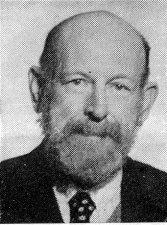
MR. GERALD BRIDSON, J.P., M.H.K. (Middle)
I CANNOT pass over these reminiscences of the early days of the Manx Labour Party without a reference to the contest in 1919 for representation of Middle Sheading in the House of Keys, The Labour candidate was Mr. T. Gerald Bridson, J.P. The sheading of Middle was at that time predominately agricultural.[37] Onchan had not then acquired the urban power which it wields today. The entry into the fiedl of a Labour candidate created a question mark as to who were to be the new representatives for the sheading. The election was conducted for the first time on an adult suffrage. The election meetings were well attended, especially so the one addressed by Gerald Bridson in the Village Hall, which was crowded for the occasion. I had promised Gerald I would support him on the platform. Gerald commenced his meeting on tine, Unfortunately, I was held up at a meeting in Douglas when I should have been in Onchan. There were no buses in those days. By the time I had finished my meeting and walked the two miles to the Village Hall, Gerald had "held the fort" for almost an hour. I was in time, however, to give him what support I could, especially on Union matters.
The "opposition" had ensconsed themselves in the room below the Hall, with the object of judging Gerald's chances of success by the volume of applause he received from the sudience, Their verdict was that he stood a good chance of success, which turned out to be the case, thus completing the quartette of Labour representatives in the 1919 House of Keys.
PERHAPS the largest election meeting ever held in Douglas was held in the Gaiety Theatre in November, 1924, It was crowded "from floor to ceiling."
The four Labour representatives elected in 1919 had undoubtedly made their mark and made their presence felt. so much so that there was a determined effort by opponents of the movement to unseat them, or at least to defeat any attempt to add to their number. George Taggart (whose death in 1958 was a great blow to the Party) occupied the chair, and the candidates were John Kelly for North Douglas, and Alderman Walter Craine and myself for South Douglas. One of the planks in our platform in that election was the continuance of the protection of tenants. The Rent Restriction Act had come to an end. It was argued by our opponents that there was no further need for the Act, but the Courts were so crowded with suits for possession that the Legislature was forced to continue the protection.
[38]
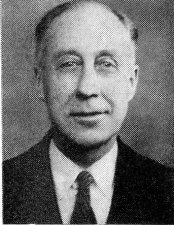
THE LATE GEORGE TAGGART, M.H.K. (South Douglas)
All three candidates dealt with what had been achieved up to date and what it was hoped to achieve if given the opportunity by being elected for a further term.
A good portion of the meeting was taken up replying to "mud-slinging" statements made by opposition door-to-door canvassers.
I personally replied to an outrageous tale which a Councillor had circulated concerning me. According to him, I was living on the credulity of the workers getting, so he said, £10 to £12 a week, whereas the fact was that my wage as the secretary of the Workers Union and the Keys "salary" combined did not amount to £5. I challenged this gentleman from the platform that if he would give me £5 every Friday he could collect my wage and my "salary." He made no response to my challenge, which I expected, and the audience demanded me to "name" my slanderer. I did so, and he was man enough to apologise,
[39]
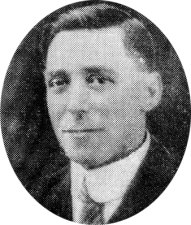
THE LATE JOHN KELLY. M.H.K. (North Douglas)
Sunday trading was a burning question at the time, following on the Shop Hours Act, John Kelly, who was in addition to his Labour activities an ardent "local preacher," dealt with this issue, and I can well remember John's final words on the subject "Sunday to me will always be Sunday." John was unsuccessful then, but was elected in 1929.
It was in this election that I carried back to the Keys with me my old friend and colleague Walter Craine (" Gus ").
LABOUR had attracted to its ranks many enthusiastic recruits, among them two young men of exceptional ability. They were Bert Stephens (who in later years himself was elected to the House of Keys as a representative for South Douglas) and Alf Yarwood, whose father at that time was manager of Rooth and Co,, butchers, in Victoria Street. To these young men was given the duty of election agents in the election. Their enthusiasm was infectious. A loyal band of workers rallied round them, willing to give any service to secure a Labour victory, [40] I would like to name a few of those stalwarts Jack Cregeen, Dick Woodall, Tom Harrison, Jim Cowley, Willie Cowley and Jim Lace (gas workers), Willie Hudson, Pat Cunningham, and Mr. T. H. Cannell, of the Salvation Army. The infection spread to local traders and shopkeepers, who were beginning to realise that a bigger wage packet for the worker meant increased turnover in their shops. A surprising feature of the support from this quarter was the help given financial, and in the supply of free vehicles, It was the gift of a charabanc by Mr. Alfred Corlett, coach proprietor, Peel Road, that carried my old colleague (Walter Craine) to victory. With that vehicle we combed the South Quay and Head Road area, with the result that Walter was returned with a majority of 26 over our opponent, Mr. T. W. Cain.
I have previously recorded how the Manx Labour Party in 1919 secured four seats in the House of Keys. In the five years that followed, the Labour Members had undoubtedly made their presence felt; so much so that in the 1924 election Labour increased its representation in the House to six. Though we were unfortunate to lose the services of Gerald Bridson as one of the representatives of Middle Sheading, we gained new seats in the representation of Garff, Glenfaba and South Douglas by the election of Walter K. Cowin, William Clucas and Walter C. Craine respectively.
WRITING OF ELECTIONS, in my campaign of 1919 I addressed five evening meetings, taking a different topic each night. In my first meeting I advocated the abolition of local school boards, and the setting up of one education authority and a system of education which gave every boy or girl the oppor tunity, irrespective of class or wealth, of progressing from the elementary school to the university.
Another night was taken up with an attack on poor law, and an advocacy of a Government Board through which destitution would be relieved without "an eye on the rates."
On another night I dealt with health matters, I advocated the "nationalisation" of the medical services, whereby all would receive equal attention without regard to how much cash folk had in their pockets.
[41]Among my audience each night were Mr. Alexander Robertson (Town Clerk) and Mr. Patterson, a typical Scot, a chemist who had a business where Messrs. Chapman and Company, travel agents, now carry on business in Victoria Street, At the conclusion of my meetings, Mr. Patterson came forward and exclaimed: "I am voting for ye, laddie. You're a dreamer, but your dreams will come true some day."
And so they have in our Health Service, our Social Service assistance, our Education Authority and our comprehensive system of education,
"WHAT DO I GET for my Union contribution ?" "What good is the Union to me?", were questions with which I was often confronted in the early days of my efforts to organise the workers, especially in my journeys into the rural areas.
I had as my companions in these visits to Highway Board and other workers stalwarts like William Clucas and Christopher Shimmin. The questions were best answered by an old Highway Board employee on one occasion when we came across a number of men working on the roads. After we had made our appeal and explained what the Workers Union stood for, this old worker said: " Can I have a word ?" living received our sanction, he addressed his younger fellow employees thus: "Boys, before this man (pointing to me) came round and got us into the Union our pay was 12/ or 15/- a week; now it is double, I pay sixpence a week to the Union, I wish I could get the same return for every sixpence I part with."
In the early days of the Manx Labour Party and the Workers Union we had quite a novel method of securing recruits. We had an excellent concert party in connection with the Douglas Branch of the Workers Union. Included in their ranks were the Horbury family, expert performers on their concertinas.[41] It was our custom to take a hall in the out-towns (in Douglas we had the Salisbury Hall). As the entertainment was free, we could always rely on packed audiences. Halfway through the programme we had an interval of a quarter of an hour, during which we made our appeal, which invariably resulted in increased Union membership and created a live interest in the Labour Party. :
I would not like these reminiscences of the growth of the Labour movement in the Island to pass without a reference to one who did so much to help me in founding the Workers Union. I refer to Philip Kennish, who was a coal carter in the employ of Drennan's, coal merchants. He was an ardent trade unionist. He had an ideal and lived up to it. Though perhaps not playing his part in the limelight, he worked hard for the benefit of his fellows, often at much personal sacrifice to himself. He was not afraid at times to argue the case from the bosses' standpoint, believing that while the worker had an undisputed right to adequate wages for his labour, so the employer had a claim on reasonable service in return. He was elected president of the Douglas branch of the Workers Union shortly after its formation, but unfortunately his life was cut short in 1919, when he succumbed to an epidemic of 'flu which prevailed at that time.
I have previously instanced several attempts by the Legislature and Government Boards to break honourable agreements, which had been signed by the Employers' Federation and the Workers Union in the early days of its existence.
In recording these attacks on wages and conditions it, is for the purpose of drawing the attention of the generation today to the fact that standards were only maintained by the loyal service of a generation who gave much of their time for the well-being of their fellows.
[43] Another instance of an attack by a Government Board occurred in July, 1926, when the Highway Board sent an ultimatum to the Workers Union that the wages of their employees were being reduced in accordance with a drop in the cost of living to 67 points. I replied to the Board that the Employers' Federation had agreed to waive any duction for the July quarter, and pointed out that as the Highway Board in 1923 had adopted the agreement existing between the Employers' Federation and the Workers Union, no cut was permissible.
This was challenged by the Board, but the following letter from their secretary was produced by the Union in support of its claims:
"I am instructed to inform you that the Board have agreed to adopt the payment of a basic wage of 24/- for roadmen, 25/- for quarry labourers, and 29/- for quarriers, to which shall be added 1/- for every five points advanced in the cost of living over July, 1924 as published in the 'Labour Gazette'. The adjustment and payment to be made in accordance with the agreement as published in the Isle of Man Employers' Federation as operating between them and the Workers Union."
Following the production of this letter the Highway Board agreed to continue payment.
I have previously given an account of the Bread Strike of July, 1918, and the events leading up to it. In the Legislative debate on the provision of the flour subsidy on similar lines to Great Britain, Lord Raglan made use of the following words in criticism of the British Government in providing the subsidy:
"This step which has been taken with regard to bread wus the most serious step England had ever taken. It would mean that never again would bread be allowed to go above ninepence."
[44]How soon was his prophecy to be proved wrong ? In early 1920, a steep rise took place in the price of flour, with a consequent increase in the price of the loaf to 1/1d.
The question was discussed at the quarterly meeting of the Douglas branch of the Workers Union. Mr. John Kelly presided, and it was decided to send a request to His Excellency to increase the flour subsidy to enable the loaf to be sold at ninepence. Mr. Kelly pointed out that more than ever bread was the staff of life. It used to be said that in the Isle of Man they would always have potatoes and herring to fall back upon, but Mr. Kelly pointed out that the cost of potatoes had become almost prohibitive, to say nothing of the state in which the potatoes were when people got them, and herrings were being sold at almost a luxury price.
Mr. Kelly suggested that at the very least the Manx Government might give them the benefit of the six months ninepenny loaf which the English people had enjoyed before the privilege was extended to the Island as a result of the strike. In that time the markets of the world might have improved and it would be possible to remove the subsidy.
The question was raised in the House of Keys and a deputation waited on the Governor. The deputation later reported that the Governor adhered to his decision not to grant an additional subsidy.
Mr, James R, Corrin, the Labour Member for Rushen, then moved that the subsidy be increased to enable the loaf to be sold at 10d. The House was divided on the issue and nothing came of it.
Largely-attended protest demonstrations were held. Mr. Gerald Bridson, who was then Labour M.H.K. for Middle Sheading, held that the master bakers' profits were too large, and advocated the setting up of a co-operative bakery.
Their appetite whetted by the success of the Bread Strike of 1918, a large element of the workers were prepared again to "down tools," but wiser counsels prevailed, as it was hoped that the world markets would right themselves and automatically reduce the price of bread.
[45]
WHEN World War I ended there was no unemployment pay as we understand it today. But there was established by the Manx Government a payment of 29/- per week to men returning from the Services or munition work while waiting for employment. It became known as "The 29th Division." It was governed by a committee representative of employers and employees. Among those serving on it were Major J, R, Drinkwater, Mr. Hughes-Games and Councillor R. H. Collister. Labour was represented by Mr. J. D. Fell (craftsmen), Mr. George Keig (farm workers) and myself (general workers). Headquarters were premises on Prospect Hill, and the secretary Mr. William Cubbon (who afterwards became head of the Manx Museum). We used to meet almost nightly, often until nearly midnight. I remember one occasion when a well-known character who was addicted to drinking methylited spirits, was being interrogated. The Chairman was trying to hurry things up, but Mr. Collister would persist in putting more questions to him. When eventually the "character" left the room, the Chairman ejaculated: "Thank God nobody struck a match!" (referring, of course, to the methylated spirits he had evidently consumed before coming inton the room),
Social workers who give their time and labour to the amelioration of distress are often accused (by people who themselves are not prepared to lend a hand) of "making something for themselves." The terms of appointment of the above committee included a payment for each meeting attended, As the meetings were held in the evenings, the three Labour members decided, as they suffered no loss of carnings, not to claim any fee. It was customary for Mr. William Cubbon, the manager, to provide a cup of tea and a bun, Although we did not claim any fee, Government Office refused to pay for this and we paid for it ourselves !
[46]
IN WRITING these reminiscences of the Manx Labour movement, my sole object has been to remind the present day generation that the conditions which they take for granted have only been secured by persistent effort of an older generation of Labour enthusiasts.
We now have the annual registration of unemployed workers following each visiting season, and we hear the usual question: "What is the Government going to do about it?"
The termination of the First World War brought to the forefront the question of how to deal with the unemployment problem. The older generation will recollect that prior to the war the Manx Government did not concern itself with the provision of work schemes or the provision of relief for the unemployed worker. Relief was entirely a matter for the Guardians of the Poor (often referred to as "Guardians of the Rates").
The Governor at that time (Sir William Fry) granted an interview to a deputation of the Workers Union. We were accompanied by Alderman George Titt, the regional secretary of the Union (who, by the way, was later Lord Mayor of Manchester). We urged that machinery should be set up to deal with the situation by the appointment of a Government Board. We were given a very sympathetic hearing, and a committee was appointed to lay before Tynwald employment schemes, which at that time were more or less confined to work provided by the Highway Board.
In 1924 Tynwald appointed a committee to consider the appointment of a Joint Industrial Board representative of public boards and federations of employers and employed, with the object of curtailing blind-alley occupations for youths and instituting an interchangeability of labour for adults.
In 1925 a Bill called the "Labour Organisation Bill" was prepared by the Attorney-General, on instruction from His Excellency the Lieutenant Governor, to carry out the report of the committee of Tynwald which sat in 1924.[47] The Bill was introdiced into the Legislative Council, but after remaining on the agenda for some time, was dropped.
In 1927 I introduced a Labour Organisation Bill. It provided for the setting up of a Board, to be designated "The Board for the Prevention of Unemployment," to consist of nine persons - five to be elected by Tynwald, two to be elected by the Manx Labour Party, one to be elected by the Isle of Man Municipal Association, and one to be elected by the Employers Feration, Its object was to prevent unemployment by the reorganisation of work, the training of youths, emigration, and in other ways.
The Bill was referred by the House of Keys to a committee, the chairman of which was that grand old Manxman Mer Richard Cain, O.B.E.
THE practice had become very prevalent of employers dispensing with employees almost as soon as the visiting season was over, thus throwing a greater burden on the shoulders and funds of the Government. To combat this, I proposed in my Bill a penalty on such employers who dispensed with their workers before a certain date.
The committee more or less agreed with my Bill, and recommended the setting up of a Board similar to the one I proposed, the only difference being an increase in the number of members from nine to eleven, The committee disagreed with my suggestion of a penalty clause for the premature discharge of workers. (What I then proposed is now a talking point in England on compensation for redundancy).
Ihe usual delay followed in implementing the recommen dations of the committee, but eventually there was set up the Enployment Advisory Committee, of which I have had the honour of being chairman ever since its inception. Government employing Boards are represented thereon, as well as employers and workers, The Manager of the Labour Exchange is secretary, and therefore in constant contact with the English Ministry of Labour, through which it is possible to place many workers in employment.
[48]
It is to the credit of the Manx trade union movement that the great improvement in the wages and working conditions enjoyed today have been achieved with a minimum of strikes.
Leaving out the famous Bread Strike of July, 1928 (which can be better described as a public protest), only two strikes of any magnitude have occurred during the last 40-odd years the dispute in the building trade in 1920 and the stoppage of work by general workers in 1935, the former lasting several months and the latter two days.
Building trade workers in England had had their wages increased to 2/- an hour, and there was a strong demand that Manx workers should have their wages brought up to the sme level. Wages in the Island were sixpence or more below that rate.
Craftsmen, other than masons, were enrolled in their respective craft unions, but the masons, who were always difficult to organise, formed a section of the Workers Union, of which I was secretary.
The Island was visited by officials of several craft unions who addressed meetings of their members, the outcome of which was the ultimate withdrawal of labour.
The Building Trades Federation had written asking for the co-operation of the masons. This was in July. The masons had a special meeting, and in view of the dearth of work, decided that the time was inopportune to present the demands contemplated and suggested leaving it to the turn of the year.
An offer of 1/9d. per hour had been made by the employers.
At a further meeting of the masons three questions were put to them to vote on: (1) Are you in favour of strike action to enforce the payment of 2/- per hour; (2) Are you in favour of accepting the offer of 1/9d.; (3) Are you in favour of accepting the 1/9d. with the condition that the difference is submitted to arbitration ? [49] By a big majority the latter (3) was carried, and as a result the masons received another penny an hour, making it 1/10d.
The other unions refused to accept anything less than the 2/- and called a strike, which lasted a considerable time, with a corresponding loss of wages.
On the morning of July 13th, 1920, the Palace ballroom was destroyed by fire. The misfortune of the Palace Company played into the hands of the unions on strike. The Palace Ballroom had to be rebuilt for the following season. If English workers had to be brought over to the Island, the English rate of 2/- an hour would have to be paid, with perhaps a lodging allowance. Therefore the Palace Company, through the contractor, agreed to pay the 2/- an hour.
The reconstruction was completed and the Palace opened the following season, But what happened to the workers ? The Employers Federation refused to give way to the demand of the unions and work was resumed on the old rates of pay, whieh remained more or less until the outbreak of war in 1939.
Tenders were being invited for the construction of aerodromes at Jurby, Andreas and Ronaldsway. Inquiries were made from me as to availability of labour in the Island from various contractors Moss and Son, Jerrards of Swinton, and Laing and Sons of Carlisle. I advised them all that there was not sufficient labour available on the Island to meet their needs, and they would be advised to base any contracts on English rates of pay and working conditions. This was followed, and the policy of tying Manx labour to English agreements was established and has continued ever since, with perhaps some small modifications.
|
|
||
| |
||
|
|
||
| Any comments, errors
or omissions gratefully received The
Editor HTML Transcription © F.Coakley , 2024 |
||